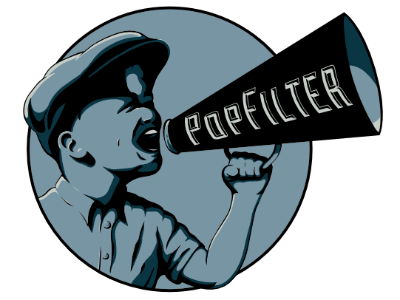Wake n Bake — Raising Arizona
WAKE N BAKE
in which Erin informs you of the best movies to blaze to
While I don’t watch it terribly often, Raising Arizona is one of those films that just gets weirder upon every single viewing. There are some films that I simply refuse to wear out–the more I memorize them, the more they lose their magic. (And I didn’t think I was superstitious, but there you have it.) This Coen Brothers flick has always been a part of that hallowed section in my brain’s video store–May Not Rent if Borrower Has Taken Out in the Past 18 Months. So if I do end up watching it, it marks a special occasion. And special occasions call for some serious baking. So let’s set a bowl on fire, shall we?
One of my favorite things about the film is the opening ten minutes. It introduces us to characters whose lives have become a shambles, everyday casualties slipping off the razor’s edge of the American Dream. They’re unable to accomplish everything that’s been drilled into their heads as the markers of success. But despite showing us just how hopeless they feel, the film couldn’t be more upbeat and lighthearted. I’m sure that the events’ general absurdity helps a lot in that regard, but it’s still a pretty cool trick.
It’s ostensibly about normal, simple folk. But our subjects are anything but. Serial convenience-store robber Herbert I. “Hi†McDunnough (Nicholas Cage) meets the love of his life at the Maricopa County Correctional Facility–Officer Ed (“Short for Edwinna, turn to the rahht!â€) They marry, and Hi stays out of prison for a time, being occupied with a factory job during the day, and a loving wife and trailer home at night. But when Ed arrives home with the sad news that she cannot conceive (and Hi cannot adopt, due to his extensive criminal record), they fall into severe relationship ennui… until they see a TV news story about a furniture salesman becoming the father of quintuplets–“More than we can handle,†chuckles the father. It doesn’t seem fair that those with so much should keep it, while others with nothing should be wanting, so they hatch a plan. They’re an unconventional couple, after all, so it’s fitting that they’d have to get a child through unconventional means. They’re a complimentary pair; they set up a nice dichotomy between… not really good and evil, but rootlessness and lawful conformity, and when the latter is driven to stray, the balance tips and disaster ensues. In this couple, it manifests in baby stealing. (A still-hilarious scene shows Nicholas Cage sneaking into the Arizonas’ house and “trying on†the various quints before settling on Nathan, Jr.) Of course, there are outside forces that don’t help much. Hi’s old jail buddies, brothers Gale and Evelle (John Goodman and William Forsythe), break out of prison through a hole in the ground and intrude upon the happy couple’s newly respectable space, much to Ed’s disapproval–never mind that it was her idea to steal an infant.
But let’s face it, there are a lot of unhelpful things in Hi and Ed’s life: the underestimated responsibility concomitant with caring for a child that has made headlines for being stolen; the Arizonas’ generous reward notice that prompts both his boss and his jail buddies to take the baby; and one Leonard Smalls, the Lone Biker of the Apocalypse, a motorcyclist prophesied by Hi and made manifest by actor Randall “Tex†Cobb, dressed in black leather and apparently not allowed to bathe for three weeks straight. He is an outlaw. He is the destroyer. He is the subject of many a cult movie fan’s message boards. In fact, the entire meaning of the film is still up-for-grabs two decades later, as people wonder what exactly the Brothers wanted to convey with the ever-present copy of “Dr. Spock’s Baby and Child Care.†Or how Hi can possess such artful prose when he is clearly undereducated and underutilized. Or why the viewer gets the weird sensation that Barry Goldwater is watching over them.
But this is part of what makes Raising Arizona such a great film to blaze to. It’s philosophical, but not snobbish. It’s a baby movie, but not cutesy or precious. And it’s got all the requisite encyclopedic symbolism that comes with a Coen Brothers project, and every time you watch it, you’ll come up with some new crazy idea. Like: maybe that baby represents a consumer commodity in America–everyone is trying to steal it, including those who already have children of their own. And why do our protagonists have to resort to illegal means to achieve the American dream? And seriously. What the hell is up with that Lone Biker? Does he represent the devil? Another side of Hi that he himself must destroy? The horror of a mother discovering her child is gone? The fear of being a bad parent?

See? He doesn’t even like my shadow puppets. Figures, all I’ve got in my repertoire is this stupid hand turkey. Who am I kidding? God, I’m a failure.
It’s got all the simple comedic pleasures, of course–a silly score replete with yodeling, cartoonish bit characters, and a chase scene involving dogs. And we get an ending in which moral order is restored, and everyone goes back to their original spots–the same way they came in. So really, it’s all you could expect in…
WAIT… Hi and Ed are both dudes’ names… even though they’re depicted as a hetero couple, maybe that’s celluloid closet code for two gay guys and their struggles in being accepted by American society, never mind having a child of their own! Oh my god! And the criminals Gale and Evelle both have girly-sounding names even though they’re dudes, and they both end up taking a shine to the baby! AND THE BIKER REPRESENTS HOMOPHOBIA! BOOM.
(sits back)



